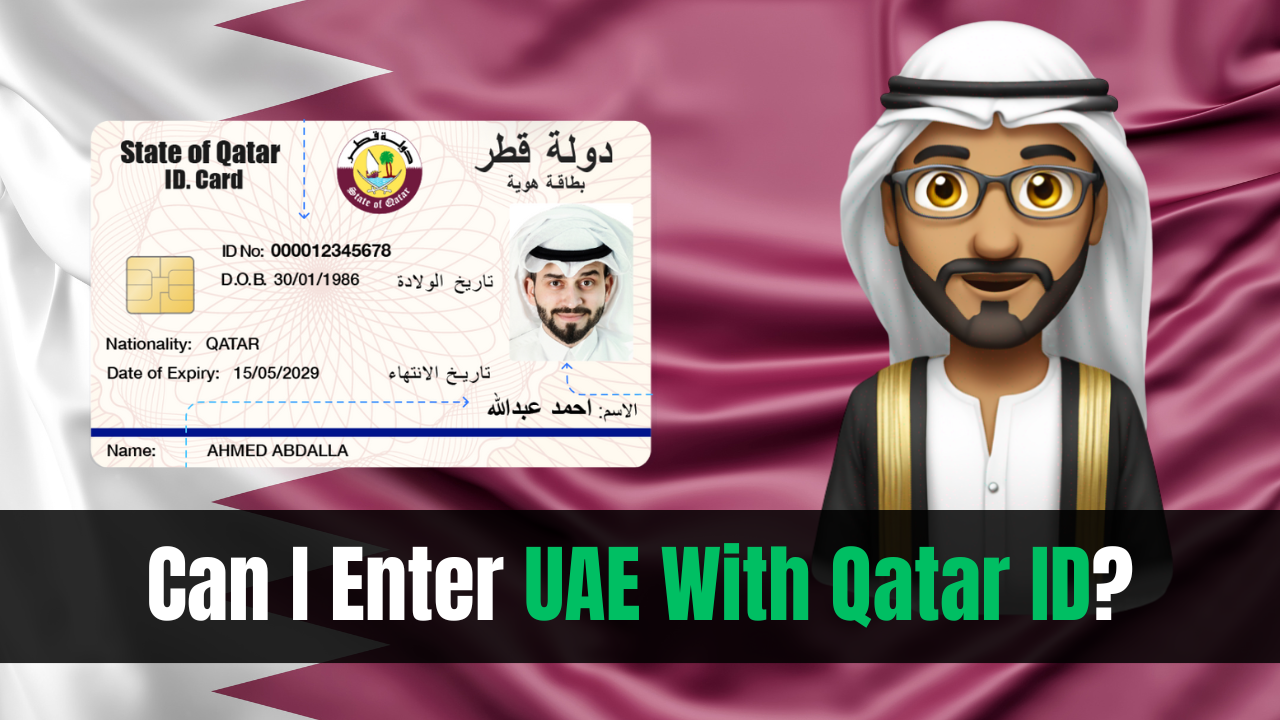Can I Enter UAE With Qatar ID? If you’re a resident of Qatar and wondering whether you can enter the UAE using your Qatar ID, you’re in luck! For citizens and residents of Gulf Cooperation Council (GCC) countries, including Qatar, the process is quite straightforward.
In this article, we will dive into the visa-free entry policy for GCC nationals, explain how it works for Qatari residents, and address key points you need to know before traveling to the UAE.
GCC Countries and UAE Entry Policy
The Gulf Cooperation Council (GCC) is a political and economic alliance comprising six Arab countries in the Arabian Gulf region: Qatar, Saudi Arabia, the United Arab Emirates (UAE), Bahrain, Kuwait, and Oman. These nations have formed a cooperative framework for economic, cultural, and political integration. One of the benefits of being a part of the GCC is the ability to travel freely among member states, and this includes visa-free entry to the UAE.
Visa-Free Entry for GCC Nationals
Citizens of GCC countries do not require a visa, permit, or the sponsorship of a UAE national or resident to enter the United Arab Emirates. Instead, they only need to produce their GCC passport or national ID card at the point of entry into the UAE. This policy facilitates easier and faster travel for citizens and residents of GCC countries.
Can I Enter UAE With Qatar ID?
While Qatar ID is a crucial identification document for residents of Qatar, it is important to note that a Qatar ID alone is not sufficient for entry into the UAE. The UAE’s entry policy requires that all travelers from GCC countries, including Qatar, provide their passport or national ID card at the border for verification.
For residents of Qatar who are not citizens but hold a Qatar residence permit or Qatar ID, the following applies:
- Qatari Citizens: If you are a Qatari citizen, you can enter the UAE simply with your Qatar passport or national ID card, as citizens of GCC countries are granted visa-free access.
- Qatari Residents (Non-Citizens): If you are a non-Qatari citizen but a resident of Qatar with a valid Qatar ID, you will still need to present your passport (along with the Qatar ID for residency verification) for entry into the UAE. The Qatar ID cannot replace the need for a passport when entering the UAE.
In summary, while Qatari residents can enjoy the privilege of traveling visa-free to the UAE, they must carry their Qatar passport or national ID card, in addition to their Qatar ID, to comply with UAE entry requirements.
How the Process Works for GCC Nationals and Residents
For GCC nationals, the process is as follows:
- Arriving at the UAE Border: When you arrive at the border of the UAE (whether by air, land, or sea), you will need to present either your GCC passport or national ID card at the entry point.
- Verification and Entry: The border authorities will verify your identity using your document, and if everything is in order, they will grant you access to the country without the need for a visa. There is no requirement for a sponsor or any additional paperwork for GCC nationals.
For Qatari residents (non-citizens), the process will be as follows:
- Prepare Your Passport: Ensure that your passport is valid for at least 6 months from your intended date of travel.
- Present the Passport and Qatar ID: Upon arrival in the UAE, present your passport for identity verification, and carry your Qatar ID to provide evidence of your residency status in Qatar.
- Entry Approval: As a Qatari resident, you will be allowed entry into the UAE without the need for a visa or sponsorship, provided your documents are in order.
Traveling to the UAE
While the process is fairly simple for GCC nationals, there are a few important tips for Qatari residents to keep in mind when planning a trip to the UAE:
- Carry Your Passport: As a Qatari resident, always ensure that your passport is up-to-date and valid for the required duration (at least 6 months from the date of entry).
- Have Your Qatar ID: While your Qatar ID is not needed for entry, it’s always a good idea to carry it with you, especially if you plan to engage in any official activities or require identification within the UAE.
- Know the Entry Point Requirements: Different points of entry into the UAE (airports, land borders, seaports) may have slightly different procedures, so it’s always advisable to check the latest travel guidelines and entry requirements from official sources.
- Check for Travel Restrictions: Ensure that there are no specific travel restrictions in place (such as COVID-19 related measures) before your departure. Check the UAE government’s travel advisory for any updates that may affect your trip.
Benefits of Visa-Free Travel for GCC Nationals
The UAE’s visa-free policy for GCC nationals and residents is designed to foster ease of travel within the region. This policy allows residents and citizens of GCC countries to enjoy the following benefits:
- Quick and Convenient Travel: You do not need to go through the visa application process, saving both time and effort when planning trips to the UAE.
- Regional Integration: This policy promotes the spirit of cooperation and unity within the Gulf region, enabling people to travel seamlessly across borders.
- Business and Tourism: Whether you’re traveling for business, leisure, or visiting family and friends, the visa-free entry policy simplifies travel logistics, making the UAE easily accessible to millions of people across the GCC.
Conclusion
Qatari residents can enter the UAE without a visa, but they must present their passport or national ID card at the UAE border. The Qatar ID is crucial for residency verification but does not replace the need for a passport when traveling. This visa-free travel policy benefits GCC nationals and residents by making cross-border travel much more convenient and hassle-free.

